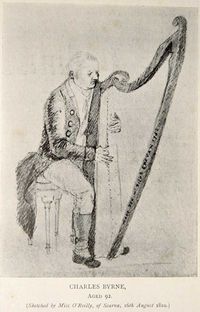Annotation:Dirty James
X:1 T:Dirty James M:6/8 L:1/8 R:Air Q:"Very Quick" N:”Author and date unknown.” B:Bunting – Ancient Music of Ireland (1840, No. 70, p. 50) Z:AK/Fiddler’s Companion K:D [F3A3d3][F3A3d3]|(dc).B (AB).c|(dc).B (AG).F|(GA).F E2D| [A3c3e3] [A3c3e3]|(fe).d (ef).g|(fe).d {c}(BA).B|(de).f e2d|| (ga/g/f/e/) (gB).B|(ga/g/f/e/) (gB).B|(fg/f/e/d/) (eA).A|(fg/f/e/d/) (eA).A| (ga/g/f/e/) (gB).B|(ga/g/f/e/) (g/a/b).g|{g}(fe)d {c}(BA).B|(de).f e2d|| (df).a (df).a|(df).a (ag).f|(eg).b (eg).b|(eg).b (ba).g| (df).a (df).a|(df).a (ab).g|{g}(fe).d {c}(BA).B|(de).f e2d||
DIRTY JAMES (That Lost Ireland). AKA and see "James the Coward," "James the Shit," "Séumus a Chaca a Chaill Eire", "Séamus an chaca a chaill Éire," "Shitty James." Irish, Air (6/8 time). D Major. Standard tuning (fiddle). AB, AABBC. The correct translation is "Shitty James, that Lost Ireland," which collector Edward Bunting politely translated as "Dirty..." in his Ancient Music of Ireland (1840). The subject of the title is the last of the Stuart kings, James II, who was succeeded in 1688-89 by William or Orange and his wife Mary, chosen to rule over England (and thus the conquered island of Ireland) by Parliament. James, taking exception to this state of affairs attempted to regain his throne and arrived in Cork in March 1689 and raised the Jacobite flag, the next year found his army in Ulster. William landed in Carrickfergus, County Antrim, in June, and with his army of Germans, Dutch, Danes, Huguenots and British headed south and met James and his Irish and French forces on the battlefield at the Boyne river on July 1, 1690. The two armies fought fiercely the entire day, but at the end James fled, thus earning his nickname. 'Chaca' is a Gaelic word meaning excrement, thus the title literally translates as "Shitty James" or "James the Shit." O'Sullivan (1983) believes the Scots tune "Lesley's March" (in Oswald's Caledonian Pocket Companion, 1760) may be related to the Bunting tune.

